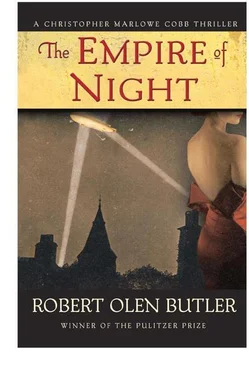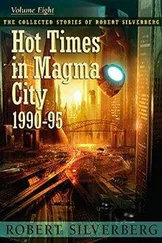The drapes were open. I crossed to the glass door, which opened onto a narrow balcony, a wrought-iron balustrade, and the Unter den Linden beyond. Under the linden indeed. The street’s wide median was thick with linden trees. I angled to my left and gazed upon still more Empire.
The Brandenburg Gate. The Germans’ vast sandstone version of the entrance to the Acropolis, its half dozen passage walls fronted with Doric columns and bearing up the bewinged goddess of Victory— Victoria , appropriately enough — standing in her chariot, driving four chargers, and hoisting a standard of the Imperial Eagle and the Iron Cross. It was lit with electric light from below, its copper turned victoriously gold but splashed with black shadows. I figured Willie must make a frequent pilgrimage the thousand yards west from his palace at the other end of Unter den Linden to see his own fate writ large up there on the Brandenburg.
Beyond the Gate was the vast linden canopy of the Tiergarten, once the private hunting ground of the prince-electors but now Berlin’s centerpiece public park.
I closed the drapes, sat on the side of the bed, and switched on my own, small, night-table splash of electric light. I opened the envelope that had been left for Joe Hunter. It was signed Sir Albert. It read: Dear Mr. Hunter, I will ring you in your rooms in the vicinity of nine this evening. I would be pleased to have a drink with you in the lobby bar.
At nine o’clock exactly, the phone rang.
At five minutes past nine I was sitting where Stockman instructed me to sit, arriving there in the way he instructed me to arrive, by speaking his name to the bartender, a clean-shaven elderly man in an Adlon-emblemed dinner jacket and black tie. The man immediately left his post and led me to the end of the room that looked onto Unter den Linden. We turned to the right and went to the farthest corner, beyond the last window. I sat in one of a pair of facing armchairs, my back to the wall. The chairs, like all the drink-and-conversation-facilitating furniture in the place, were dark Spanish leather with cabriole legs and curving crests and arms.
“ Ein Joppenbier, bitte ,” I said, ordering a fine, odd German beer made in Danzig, and he nodded and disappeared.
Stockman had arranged for us to be private. This dim, far-corner setup seemed designed for that. At the nearest cluster of chairs and table, before the windows, four young German officers sat huddled close, drinking. Their feldgrau was fresh. From that and from the intensity of their drinking and the bloom of their cheeks it was clear they’d not yet seen battle but were soon to be shipped out to the front.
I watched them talking low, laughing a couple of times, but in a subdued way, and then talking again, and now they sat back, first one and then the others, thinking quietly, inwardly, and drinking for a moment as if they were each alone, and now they resumed talking.
A few minutes passed, and then Stockman’s towering figure swooped into the bar and headed in my direction. He was dressed in a German-style informal evening suit with silk-faced lapels and a double-breasted waistcoat. I rose to greet him and we shook hands with a nodded hello. He’d arrived before my beer did. As soon as he and I settled onto our chairs — he with his back to the young officers — the bartender showed up, though empty-handed.
“What are you having?” Stockman asked.
“A Joppenbier ,” I said.
He looked at the bartender, and with a soft little nod he held up two fingers. The man vanished instantly.
“You know the beers,” he said.
“Some.”
“A German will order a Joppenbier . Not so often an outsider.”
“I am German,” I said.
He made exactly the same small, familiar nod he’d just used with the bartender. “Are you not an American as well?” His voice was as gentle as the nod.
“Yes.”
“Is that possible?” he said.
I needed a good answer for that and a quick one, to seem sincere, and I tried to think fast. The bartender rescued me by appearing with our beers.
He put two white, lidless steins on the small, polished mahogany table between the chairs. The beers had come very quickly after Stockman’s order. Which meant the bartender had deliberately kept mine back until Sir Albert arrived. I was right about the familiarity between them. Not to mention the barman made the delivery himself, even as a couple of black-coated waiters were working the rest of the room. Our Sir Albert was a celebrity here.
Stockman leaned forward and took up his stein as the bartender vanished. I picked up mine as well. Its only decoration was the hotel crest in gilt: the planet earth, upon which sat the Imperial Eagle of the German Empire and below which, in an unfurled banner, were the words Adlon Oblige .
He offered his stein across the table and I touched his with mine. We neither of us spoke a toast.
The beer was dark — very dark, nearly black — and it had a pretty stiff kick, and it was heavy in the mouth, almost like syrup.
Stockman put his stein down, as did I.
“So?” he said.
I was unsure enough of my true standing with him that the monosyllable seemed ominous, as if he were trying to bluff me into a confession of something he suspected but could not specify. I’d used that trick myself with some of the stupider Chicago politicians.
I had no choice but to proceed as if everything was just fine between us. “Is it possible to be both American and German?”
“That is my question,” he said.
“Can I speak honestly?” I said.
“For as long as we sit in this bar tonight, I would like that to be the rule for us both.”
That he would assert this — and with a quickness and vibrancy that seemed utterly sincere — made my breath catch in its ambiguity. Either trust was growing between us or he was laying a trap.
He leaned near. “How much of a journalist are you?”
This didn’t sound good. But once more I had no choice.
I said, “I am a journalist whose intention is to properly represent a country, a Kultur . What is the measure of such a journalist?”
Stockman considered this for a moment, his eyes intently fixed on mine. He said, “Forgive me for speaking as I am about to. But we are being honest.”
“Of course,” I said.
“I say this not from a distrust of what you have just declared. But perhaps a concern over what you might include in such a story, no matter how noble its intention.” He paused. He let this soak in.
He didn’t say he trusted me as Joseph W. Hunter, but I liked his disavowal of distrust. Still, I knew his method. I waited for the threat. I was interested to hear it.
“I am a powerful man,” he said. “Here and in England and abroad, even in America. I have associates in all those places. Friends. And they exercise my power on my behalf.” He paused to let me work out the implication. I figured his next step was to clarify what offense on my part would engage his friends.
It was clear enough already. I decided it would be a good strategy to anticipate him. “Sir Albert,” I said, “I will never publish, never write, never repeat a word you say to me unless doing so is explicitly discussed and agreed upon between us.”
“I am glad to hear it,” he said.
He sat back. He laid his elbows on the arms of the chair. He intertwined his fingers before him and rubbed first one palm and then the other with the opposite thumb. His hands came to rest.
He seemed satisfied.
“You were going to say,” he said. “Honestly.”
We’d returned to the question of being both an American and a German.
Читать дальше












